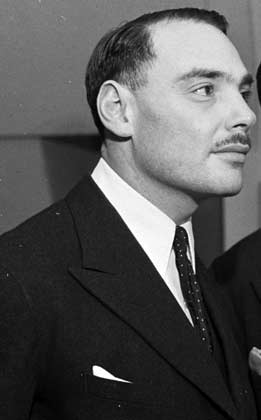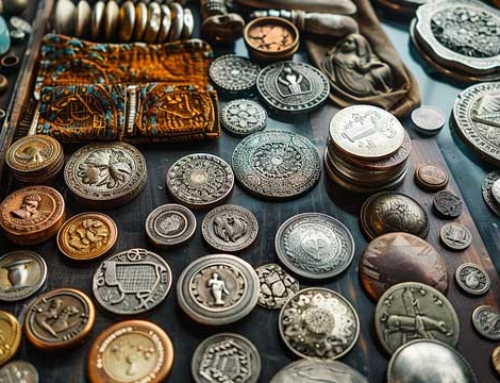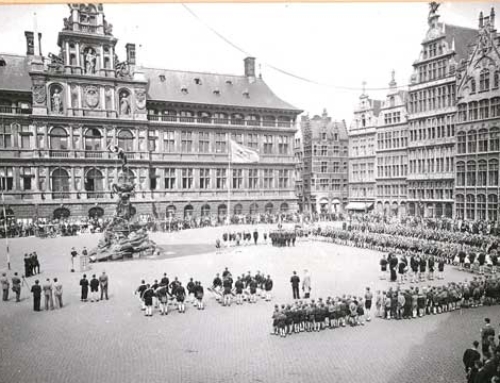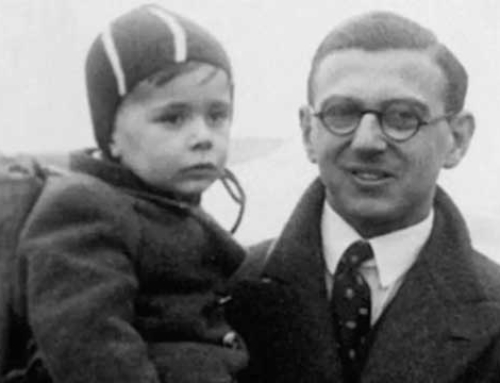In the diamond industry, Harry Oppenheimer is known as the former head of De Beers. As the man who controlled the diamond industry worldwide for decades. However, that description does not do him justice. He controlled large gold and platinum assets and was a South African MP who fought against the country’s apartheid regime.
Harry Frederick Oppenheimer was born on October 28, 1908, in Kimberley, South Africa, the site of the first African diamond rush. He was the son of Sir Ernest Oppenheimer, who founded the mining giant Anglo American and later took control of De Beers. From an early age, his father prepared him to take over the family’s business empire.
Although his father, the son of a Jewish cigar maker from Friedberg, Germany, converted to the Anglican faith in the 1930s, Harry experienced a formal Bar Mitzvah (the Jewish ceremony of coming of age) in a synagogue. When he married, he joined the Anglican Church, but remained a staunch supporter of Jewish interests and the Israeli diamond industry.
After completing his primary schooling in Johannesburg, he was sent to the Charterhouse School, a public school in England, preferred by wealthy “English” South African families at the time. He then went on to study at Christ Church, Oxford University, where he was taught by the British economist Sir Roy Harrod and graduated in Philosophy, Politics and Economics in 1931.
World War II
Harry Oppenheimer volunteered for military service early in World War II. He joined the 4th South African Armored Regiment as a brigade intelligence officer. There he worked with the British Army in North Africa. In 1940, after his transfer to Coastal Command, he met Signals Lieutenant Bridget McCall. They married in 1943, and the following year Oppenheimer resigned his post and joined Anglo American.
In 1948, he was elected to the white liberal minority position and became the second “Member for De Beers.” He soon became the leading voice of the opposition on economic issues and took a liberal position on most issues. In his political career, however, he became best known for his stance against apartheid. Opinions differ about Oppenheimer’s role in the fight against extreme racial discrimination policies.
In an interview with The New York Times, Harry Oppenheimer said that a majority government should come in stages. With guarantees of the rights of different groups in the country. “I think if you insist that there are no guarantees of group rights, the effect would be that you would have no movement at all,” he said. Although his opposition to apartheid was based on humanitarian grounds, he mostly argued against it in economic terms. “I never thought that the policy of racial discrimination had been a great benefit to business,” he said. “Because it might have had the effect of keeping wages low, but it also had the effect of keeping labor extraordinarily inefficient. I believe apartheid is something that works against the interest of economic development, not for it.”
Sanctions against South Africa
He also opposed economic sanctions against South Africa as a way of pressuring the country to abandon apartheid. For he argued that a growing economy was a better environment for political change than a shrinking economy. “I am not among those who think that sanctions have no effect,” he said in an interview in 1987. “I think they have a very serious effect in South Africa, but I think the effect is bad in the sense that it puts pressure on people who are on your side anyway. And it certainly doesn’t force the government to change its policies”.
Harry Oppenheimer supported the creation of unions for black workers. He also played a key role in ending a system that restricted certain jobs to whites only. And he developed programs to train blacks so they could take responsible positions in his corporate group.
In 1957, after his father’s death, Oppenheimer left parliament to take over the family’s business empire. He lent his political and financial support to the Progressive Party and its only MP, Helen Suzman.
Business success
As chairman of Anglo American and De Beers, he built an imposing personal empire that extended beyond precious metals and diamonds. It also included interests in banking, real estate, pulp and paper, bricks and pipes, coal and potash, locomotives and beer. Thus he became one of the richest people in the world and the most powerful economic figure in South Africa. At one point, his public companies represented more than half the value of the Johannesburg Stock Exchange.
During his 27-year career with De Beers, Harry grew the diamond empire in a sometimes very challenging environment. By aggressively promoting diamonds in the consumer markets. In doing so, he championed a unique marketing approach of generic advertising that promoted diamonds in general. This was in contrast to the usual approach of promoting a brand. In this way, the company generated greater sales of diamonds mined by De Beers, as well as diamonds mined by other companies.
To maintain De Beers’ leading position, Oppenheimer sought to buy rough diamonds from other diamond miners. Whether they were large producers or small-scale alluvial miners, the argument was that if a single source sold most of the world’s supply of rough diamonds, all diamond producers would benefit. This allowed the company to continue its generic advertising, maintain a list of select customers known as sightholders, and exert great influence over the entire diamond pipeline through careful control of supply and demand. Mainly by maintaining a large inventory of rough diamonds and bringing the goods to market at a moderate pace.
When Oppenheimer took control of Anglo American, the value of the company was estimated at 65 million rand. Thirty years later, the net worth of the company his father had founded was 24 billion rand.
He stepped down from his position at Anglo American in 1984, although he retained his large stake in the company, and continued to visit the Johannesburg headquarters. Oppenheimer, famous for his dry wit, once said of those visits that he made them “to talk to my friends, they even ask for my opinion from time to time.”
Avid art collector
Outside of politics and running the two companies, Oppenheimer was an avid art collector. His house was hung with paintings by Picasso, Goya, Degas, Chagall, Sisley, and Dufy. One of the paintings he owned was by Renoir, and he reportedly bought it in London for $40. He also collected African art and manuscripts by English poets, including Lord Byron, whom he admired for his “curious combination of the romantic and the practical.”
His philanthropic activities were extensive, but he did not brag about them. According to The New York Times, his philanthropy included the “usual,” as he put it: hospitals, the Boy Scouts, the Girl Scouts, and seed money for education, especially for blacks. He helped establish the South Africa Foundation after the Sharpeville massacre in 1961. In response to the Soweto uprising in 1976, he helped establish the Urban Foundation. This was dedicated to improving the living conditions of black South Africans in the cities, providing millions for welfare and housing programs for blacks.
Harry Oppenheimer died on August 19, 2000 at the age of 91. He was survived by his wife, daughter Mary, and son Nicholas ‘Nicky’ Oppenheimer, who took the helm of De Beers after his father, a position he held until he sold the family stake in the company to Anglo American.







